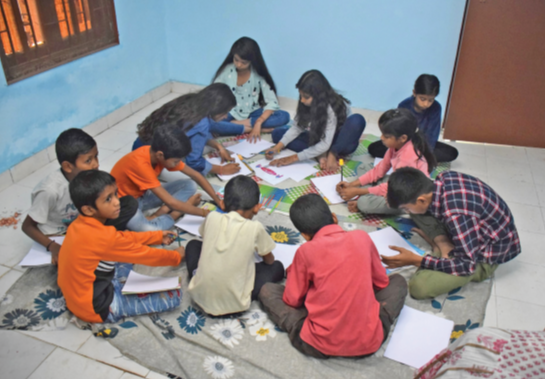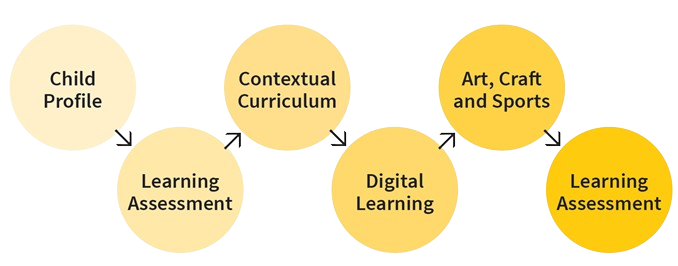Our Story

 In the growing cities of India, behind the speed of construction and the glitter of new skylines, live families that build these cities – but remain unseen in their growth. Among them are the children of migrant workers – bright, curious, and resilient, yet often left behind in the race for education and opportunity. These children often live in informal settlements, where homes shift with seasons, parents leave at dawn for construction sites, and schools often feel distant – physically and emotionally. Their learning is broken not because they lack ability, but because the system was never built for them.
In the growing cities of India, behind the speed of construction and the glitter of new skylines, live families that build these cities – but remain unseen in their growth. Among them are the children of migrant workers – bright, curious, and resilient, yet often left behind in the race for education and opportunity. These children often live in informal settlements, where homes shift with seasons, parents leave at dawn for construction sites, and schools often feel distant – physically and emotionally. Their learning is broken not because they lack ability, but because the system was never built for them.
In 2021, Deshkal Society began an intensive field study in Noida and Greater Noida, speaking to hundreds of families, children, school authorities, and community leaders. The findings were clear and heart-breaking. The school system, as it exists, struggles to include migrant children meaningfully. Girls, in particular, face additional hurdles: household responsibilities, digital illiteracy, safety concerns, and early dropout.
This ground reality compelled the creation of Anandshala, not as a charity, but as a response to structural exclusion. Thus, with the encouragement of eminent educators, researchers, artists, and public intellectuals, and the support of community members themselves, Anandshala took shape as a space where education could be joyful, rooted, and dignified.
We started small – with a few families in Gejha, a few volunteers, and a shared dream. Today, Anandshala runs digital learning centres, after-school support classes, creative workshops, and mothers’ circles in the Shramik Kunjs. Our focus is on first-generation learners, especially adolescent girls, equipping them with the skills, confidence, and care they need to stay in school – and step into the future. This story belongs to every child who dares to dream from the margins, to every mother who wants more for her daughter, and to every teacher who believes education must meet children where they are.
Anandshala means a joyful place of learning, and that is what we’re building – one story, one skill, one spark at a time!
About Anandshala
Anandshala is a flagship education initiative of Deshkal Society, created to support the learning journeys of children from migrant and marginalised communities—particularly adolescent girls who face systemic barriers to staying in school.
Rooted in intensive field research and developed with the guidance of educators, researchers, and artists Anandshala addresses the overlapping challenges of educational discontinuity, digital exclusion, and limited access to life skills that affect migrant children living in urban informal settlements. Recognising the layered challenges faced by these children – including frequent school disruption, digital exclusion, and lack of academic support at home – Anandshala intervenes at both educational and emotional levels. It provides home-based learning support, foundational digital and computer literacy, and access to market-oriented skills.
Launched in the Shramik Kunj clusters of Gejha village, Anandshala works directly with adolescent girls in Grades 9-12 enrolled in government schools, as well as younger children from the same families. These are often first-generation learners, navigating not only poverty but also a system that offers little structural support for continuity in education.
Anandshala offers a dynamic learning environment that combines:
- School-based support for foundational learning and classroom inclusion
- Digital education and skill-building through Apni Paathshala
- Home-based learning tools
- Community engagement with mothers and caregivers
With its expansion across six Shramik Kunj communities, Anandshala now aims to reach over 1,500 children and adolescents in the coming years, building pathways from learning to livelihoods through partnerships, internships, and exposure opportunities in the local urban ecosystem.
At the heart of Anandshala is the belief that learning must be joyful, rooted, and relevant, a process that values expression, confidence, and connection. By bridging formal education with lived realities Anandshala works to ensure that no child is left behind because of who they are or where they come from.
Our Approach
Anandshala approaches learning not as a one-size-fits-all model, but as a process deeply rooted in children’s everyday realities – particularly those of girls from migrant worker households in urban informal settlements.
Our work is shaped by three core principles: inclusion, contextual relevance, and future readiness. We prioritise learning environments that are empathetic, community-connected, and responsive to the socio-economic barriers that children face.
Our approach combines the following elements:
- Participatory and Learner-Centred Pedagogy
We create non-hierarchical spaces where children – especially first-generation learners – can explore knowledge at their own pace, through dialogue, creativity, and real-life application. - Bridging the Formal-Informal Gap
By supplementing government school curricula with flexible learning support, Anandshala helps children stay in school, complete assignments, and prepare for exams without the pressure of coaching culture. - Integrating Digital and Foundational Learning
We integrate basic digital skills with functional literacy, communication training, and creative tools, helping learners navigate both classrooms and the digital world with confidence. - Gender-Responsive Learning Design
Every aspect of our work, from content to delivery, is designed with an understanding of the gendered barriers adolescent girls face in accessing education and self-expression. - Trust-Building with Families and Communities
We work closely with caregivers and local networks to build awareness, ownership, and sustained support for children’s educational journeys.






